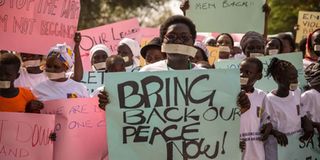World peace depends on women’s leadership

What you need to know:
- Women play key roles in conflict prevention and peace promotion.
- October 2020, marks 20th anniversary of the United Nations Security Council Resolution (UNSCR) 1325 on Women, Peace and Security.
- KNAP IIanchored on Kenya’s Constitutional commitments, provides platform to amplify women’s voices.
- Interior aministry has increased number of women in peace committees, signalling a two-fold increase from 14 per cent to 19 per cent.
Covid-19 is the latest addition to Kenya’s ongoing security and humanitarian crises including drought, floods, locust swarms, violent extremism and border disputes. All these play out against the backdrop of high unemployment, poverty and social inequality.
In such times, women, children and vulnerable groups – including the urban poor, refugees and migrants - face significant vulnerabilities including lack of access to basic needs and services, loss of livelihoods, increased burden of unpaid care work and a rise in gender-based violence (GBV). There has been, for example, a 42 per cent spike in reported cases of GBV in Kenya since movement restrictions were imposed.
In the face of such challenges, it is important to highlight the strength of women, who have shown great resilience, playing key roles in conflict prevention and peace promotion throughout the continents’ political history. Actively advocating for institutional and legal reforms, they have been instrumental in promoting inclusive recovery processes that benefit all in society.
Crucial year for women
In the face of uncertainty, women’s roles in conflict management remain crucial, working on the frontlines to provide humanitarian assistance, psychosocial support, and mobilising as first responders to gender based violence.
2020 is a crucial year for the Women, Peace and Security agenda (WPS) globally and in Kenya. October 2020 is the 20th anniversary of the landmark United Nations Security Council Resolution (UNSCR) 1325 on Women, Peace and Security (WPS), that put women at the front and centre of the global peace and security agenda.
It calls for women’s full and equal participation in all aspects of conflict prevention and resolution, peacekeeping and peace-building and decision-making at all levels of governance. It also calls for women to be better protected from human rights violations and have access to justice and services to eliminate discrimination.
The Kenya government demonstrated its commitment to advancing gender equality and women’s empowerment as it launched its second-generation action plan on the implementation of UNSCR 1325 (KNAP II) on May 27, 2020, bringing together Cabinet Secretaries of Defence, Public Service and Gender and Foreign Affairs, County governments, Heads of Diplomatic missions/UN agencies and civil society.
KNAP II is anchored on Kenya’s Constitutional commitments and provides a platform to amplify women’s voices - including young women - at grassroots, county and national levels to participate and lead in governance processes and the foundations for peace.
Women's participation
Since the domestication of UNSCR 1325, Kenya has made commendable strides to enhance women’s participation in peace and security. Key milestones include the development of the Ministry of Defence’s first Gender Policy, resulting in increased participation and decision making in its ranks, and the appointment of the first ever female Major General, Fatima Ahmed.
The Ministry of Interior and Coordination of National Government has increased the number of women in peace committees, signalling a two-fold increase from 14 per cent to 19 per cent (2013 – 2018). The National Police Service also noted an increase of women in Assistant Inspector General positions and an overall increase across the service from 8 per cent to 14 per cent (2015 – 2020).
Civil Society organizations have also worked around the clock to bring the agenda to the communities they work in, ensuring women at grassroots are part of governance, peace and security conversations.
Despite gains, more is needed to ensure greater women’s meaningful participation. We can start by advocating for a faster enactment of the two-thirds gender rule, which will enable higher representation of women in decision making positions in governance and peace and security, thus strengthening prospects for sustainable peace and establish cohesive societies.
Practical interventions
A global study commissioned by UN Women, shows women’s participation in peace processes increases the probability of lasting peace by up to 35 per cent.
The WPS agenda remains a priority for development partners in Kenya. UN Women will continue advocating for the full implementation, monitoring, reporting, financing and accountability for KNAP II. The Government of Finland is a champion of WPS in Kenya and globally, and is keen to support efforts towards gender-inclusive, sustainable and peaceful societies, in line with Finland’s third National Action Plan. Together, UN Women, Finland and other development partners will continue to support KNAP II implementation, turning strategies into practical interventions that promote the peace dividend to be harnessed and enjoyed by the entire population of Kenya.
Women have proved, over time, to be important agents of peace. Applying a WPS lens to Covid-19 and other emergencies provides valuable guidance on the fundamental need for women’s rights - and leadership - to be at the forefront. When women are meaningfully included, the challenges we face today have the potential to be a catalytic moment for change and sustainable peace in Kenya and beyond.
Anna Mutavati, UN Women Kenya Representative
H.E. Amb. Erik Lundberg, Ambassador of Finland to Kenya



